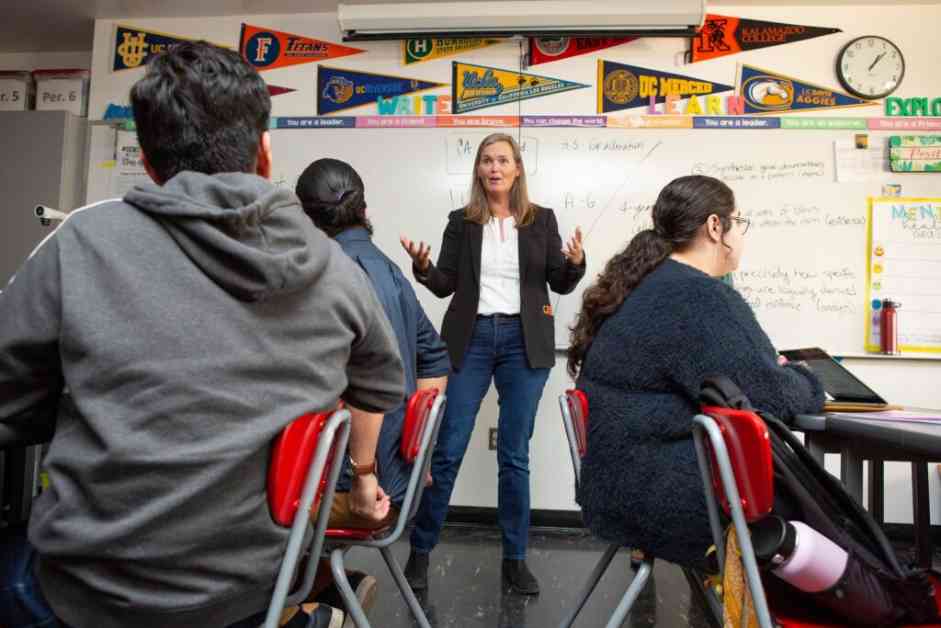Navigating the FAFSA Process: A Community School’s Success Story
High school seniors recently celebrated their graduation, but for some, the excitement is overshadowed by the FAFSA fiasco that has left them uncertain about their college plans for the fall. The Free Application for Federal Student Aid (FAFSA) was intended to simplify the process of applying for financial aid, but instead, it presented new challenges for students at the UCLA Community School in Koreatown, a public school within the Los Angeles Unified School District.
Despite the difficulties faced by our predominantly working-class Latino students, our counseling team at UCLA Community School saw an opportunity to teach valuable lessons on overcoming systemic challenges. As a first-generation college student myself, I collaborated with colleagues in the College Center to provide our students with the necessary knowledge to navigate a system that often seems stacked against them.
Community schools like UCLA Community School are designed to anticipate and address the unique challenges and barriers that students and their families may encounter on their educational journeys. These schools work closely with community agencies and local government to offer a range of resources and services to support students and their families.
Two years ago, recognizing the need for additional guidance, we introduced a College and Careers Transition course to assist seniors in developing post-high school plans. Little did we know then how crucial this course would become in light of the FAFSA fiasco that unfolded this year. The technical issues surrounding the FAFSA application process resulted in delays in financial aid packages for students who were reliant on federal aid to make informed decisions about their college choices.
First-generation college students and underserved communities have always required support during the application process, but this year’s challenges underscored the importance of that support more than ever. Through partnerships with UCLA, the Fulfillment Fund, and Gear Up 4 LA, we were able to provide students with one-on-one assistance in accessing financial aid and educate them and their families on navigating the FAFSA process.
While students were given class time to complete the application, many required additional support. One student, whom I’ll refer to as Nadia to protect her privacy, faced significant hurdles in the application process. Despite her acceptance to prestigious colleges, Nadia encountered difficulties verifying her parents’ identities due to their mixed-immigration status. This issue was not unique to Nadia, as many of our students faced similar challenges that prevented them from completing the FAFSA form accurately.
The inability to provide a parent’s signature on the form resulted in the Student Aid Index (SAI) not being calculated, leaving students uncertain about the amount of financial aid they would receive. While temporary solutions were provided by FAFSA, many students, including Nadia, did not receive provisional aid letters by the critical May 15 deadline observed by most colleges in California.
Due to the looming deadlines, Nadia made the difficult decision to defer her admission to her second-choice college, unwilling to risk committing to a school without knowing if she could afford it. Finally, after months of waiting, Nadia was able to access her Student Aid Index and opted to attend a community college for both academic and financial reasons. However, just before graduation, she received an offer from her dream school, the University of Southern California (USC). Over the following week, Nadia demonstrated the lessons learned in our course as she advocated for herself to secure her aid package from USC, ultimately securing her spot at the university.
While Nadia’s story had a positive outcome, many students faced significant challenges in making informed decisions about their college choices. Some felt pressured to commit to schools without aid packages or deferred their plans to attend community college to mitigate financial risks. The experiences of these students highlighted the importance of providing tailored support to help them navigate the complexities of the college application process.
Looking ahead, we remain hopeful that future FAFSA processes will be smoother, but this year’s challenges have underscored the critical role of college access programs in supporting first-generation college students. By empowering students with the knowledge and resources they need to navigate the system, we can help them overcome barriers and achieve their educational goals.
As we reflect on this year’s FAFSA fiasco, it is clear that the support and guidance provided by community schools like UCLA Community School are essential in ensuring the success of first-generation college students. By working collaboratively with partners and leveraging resources, we can help students overcome obstacles and realize their full potential in higher education.
